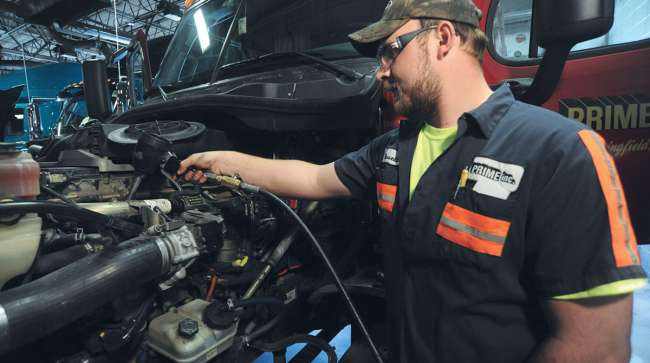Senior Reporter
House Passes Internal Combustion Engines Legislation

[Stay on top of transportation news: Get TTNews in your inbox.]
Legislation aiming to block efforts designed to prevent the sale of internal combustion engines was recently approved in the U.S. House of Representatives.
By a vote of 222 to 190 on Sept. 14, the Preserving Choice in Vehicle Purchases Act advanced to the Senate. Sponsored by Rep. John Joyce (R-Pa.), the bill would restrict the Environmental Protection Agency from issuing waivers specific to the sale or use of new motor vehicles equipped with the traditional engines, including diesel units.
Republican sponsors explained the measure would preserve the integrity of consumer choice as well as secure marketplace competition. Central to the bill is responding to California lawmakers targeting the sale of vehicles with internal combustion engines.
“This bill would prevent the EPA administrator from granting a waiver to any regulation that would limit the sale or use of new vehicles with internal combustion engines,” Joyce told colleagues on Sept. 14. “We cannot expect vehicle manufacturers to build one car in California and another one for Pennsylvania. In areas like my district in central and western Pennsylvania electric vehicles are unable to perform in the mountainous terrain and lose range in high heat and in extreme cold.”
Rep. Mike Kelly (R-Pa.), backed Joyce’s bill. “First it was gas stoves. Now it’s gas-powered vehicles. California liberals shouldn’t be telling hardworking Pennsylvanians what car or truck they can drive,” Kelly posted on social media on Sept. 14.
A version of the bill has been introduced in the Senate. However, the chamber’s Democratic leadership has not signaled its committee consideration.
“We cannot allow California’s costly and extreme Green New Deal agenda to eliminate consumer choice for hundreds of millions of American families,” Sen. Markwayne Mullin (R-Okla.), a key sponsor, said shortly after the vote on the companion legislation in the House. Green New Deal refers to a progressive climate change manifesto. “Our bill, the Preserving Choice in Vehicle Purchases Act, is an important step in rejecting the far-Left’s attempt to control every aspect of Americans’ lives — including what car they drive. I’m thrilled that my colleagues in the House recognize the importance of protecting consumers and maintaining competition in the automotive industry, and I look forward to this bill’s consideration in the United States Senate.”
Co-sponsoring the bill are Sens. Roger Marshall (R-Kan.), Pete Ricketts (R-Neb.), John Barrasso (R-Wyo.), Ted Cruz (R-Texas), Kevin Cramer (R-N.D.), Dan Sullivan (R-Alaska), Roger Wicker (R-Miss.) and John Hoeven (R-N.D.).
The White House expressed its opposition to the legislation, noting the bill would “restrict the ability of California and its citizens to address its severe air pollution challenges.”
Want more news? Listen to today's daily briefing above or go here for more info
American Trucking Associations is among stakeholders endorsing the bill. ATA Executive Vice President of Advocacy Bill Sullivan has indicated: “ATA believes we must set national, achievable and realistic targets and timelines along the way to our shared goal of zero emissions. Those efforts must be made through a lens of technology neutrality, allowing innovation to provide a wide range of solutions that meet the diverse needs of the trucking industry.”
Todd Spencer, president of the Owner-Operator Independent Drivers Association, also backs the bill.
“California should not be setting policy for America — that is the responsibility of Congress,” Spencer said in a statement that accompanied the bill’s introduction. “It’s no surprise we’re seeing small-business truckers leaving the state in droves for opportunities elsewhere. Vehicle reliability and affordability are top priorities for OOIDA members. We have yet to see proof that electric commercial motor vehicles are a realistic option for trucking businesses, especially small-business truckers, considering the price tag and lack of charging infrastructure.”




